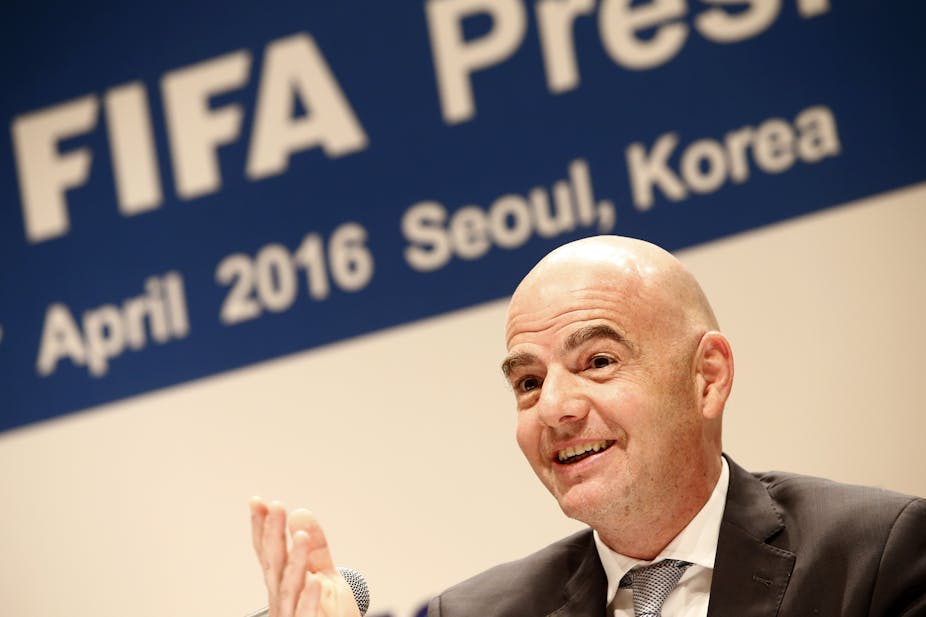Following months of turbulence, FIFA meets this week in Mexico City for its 66th Ordinary Congress – the first under its newly elected president Gianni Infantino. The congress comes just a few weeks after the new FIFA statutes came into force, flagging a wide range of reforms designed to help football’s governing body win back public trust.
This is the first opportunity for FIFA to demonstrate its real commitment to eradicate corruption after years of being tainted by the whiff of scandal. The agenda only has a small number of meaningful items given that very little time has passed since the start of the reform process.
For the first time in many years, the president of European football’s governing body (UEFA), Michel Platini, will not attend. He was a major power broker in FIFA and the leading candidate to become its next president until, late last year, he was banned from all football activities by a FIFA ethics committee after being found guilty of receiving a payment of 2m Swiss Francs (£1.3m) from FIFA when his contract had actually ended. Following an unsuccessful appeal to the Court of Arbitration for Sport, Platini resigned as UEFA president.
There has been lots of talk about reform in FIFA so far – but now it is time to walk the walk. And it can do so in three key areas: economic, governance issues and geopolitical strategy.
In economic terms, the FIFA Congress will adopt a new revised budget for the period 2015-2018. This is important, because Infantino was elected on a promise to improve transparency in the allocation of funds. He also promised to give more money to national football associations around the world. So this is the first opportunity for the footballing world to see how FIFA money is distributed, to check what the strategic priorities of the organisation are and to ascertain whether real controls are going to be put in place.
This is also an opportunity to demonstrate a commitment to transparency in publishing the budget figures. But it is a failed opportunity, so far – as the appendix with all the budget and financial information had not been made public on FIFA’s website at the time of writing.
In governance terms, the congress will serve to measure the enthusiasm of the delegates for reform. There will be an update and debate on “strategic and sports-political matters”. Here, it will be very important to analyse the language used by the president and representatives from national federations that take the floor. It will also be necessary to see if the congress confirms the timeline for the implementation of reforms or decides on any delays.
Getting the personnel right
One of the key areas for discussion (although a relatively obscure point on the agenda) will be the election or dismissal of members of the judicial committees for audit and compliance and governance.
The Audit and Compliance Committee is an existing body, but the new reformed statutes have increased its power of oversight. The committee will now control how FIFA manages its commercial agreements, how it distributes its development funds and elects the organisers of its competitions. There is also the promise that this committee will be “fully independent”. Such independence is defined as not having any financial, material or paid relationship with FIFA, continental confederations or national federations in the past four years.

The Governance Committee, on the other hand, is a completely new structure. Half of its membership must be “independent”, including its chair and deputy chair. Its remit is not particularly well defined – as it stands it has a vague role to advise the FIFA Council (formerly known as FIFA Executive Committee) on governance issues as well as monitoring changes in governance structures and regulations.
The way in which this new governance committee shapes its own powers will be important. It will decide whether it is going to be a guardian of good governance within FIFA or just a talking shop. And this starts, naturally, with the election of its members. Here, it is necessary to look at whether the members are really independent or not. Another important element is whether the elected members possess skills related to governance or not. Finally, a gender and geographical balance would increase democratic representation in the committee.
In all this process, the newly established FIFA Council plays an important role. It will meet a couple of days before the congress and it has the power to propose the candidates for the elections of both committees. In other words, the council will decide the range of candidates the congress can select from. So whereas the result of the congress vote will be telling, the decision of the new council may well indicate how far FIFA is really prepared to change and in which direction.
Welcoming new friends
Finally, the FIFA congress may also decide on the admission of the Football Federation of Kosovo. This point is dependent on the relevant checks and paperwork being done on time after the recent admission of Kosovo as UEFA’s 55th member. Whereas not directly linked to reform, the debate about the excessive power of small football nations in FIFA – such as the likes of Trinidad and Tobago and others from the Caribbean – can only be intensified with the admission of Kosovo.
By the time FIFA members meet again in 2017 in Kuala Lumpur the organisation needs to have delivered on some of these reforms. But it will be interesting to see the decisions taken in Mexico as this will indicate how far FIFA is really prepared to go with its promised reform process.
For the past year FIFA has talked the talk on reform. Among the beautiful streets leading to Mexico City’s Zócalo and the ruins of the Aztecs, FIFA members have an opportunity to walk the walk. But given the city’s altitude, some might feel excessive exercise is not recommended at this point.

